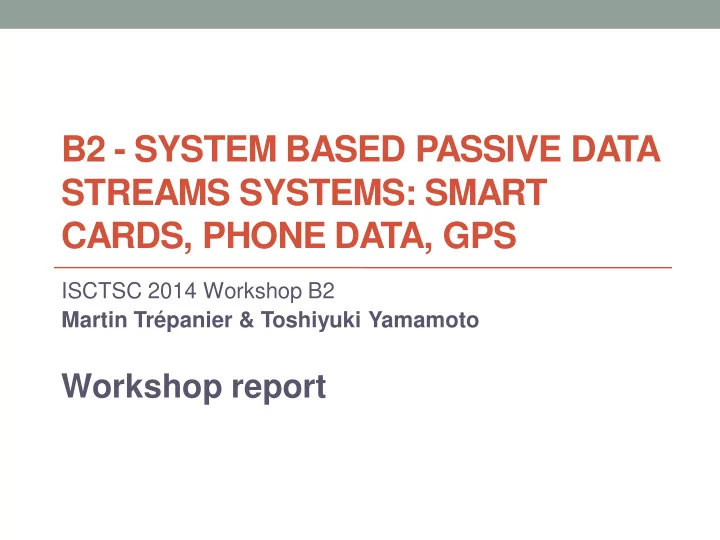

B2 - SYSTEM BASED PASSIVE DATA STREAMS SYSTEMS: SMART CARDS, PHONE DATA, GPS ISCTSC 2014 Workshop B2 Martin Trépanier & Toshiyuki Yamamoto Workshop report
Main issues and research opportunities • Privacy • Data validation and other challenges • In general • By type: GPS data, phone, bluetooth data, smart card data • How to add socio-demographic information? • Role of passive data streams in transport planning and modeling
Privacy and data control Passive • Produced by other than our intention (secondary data) • No user interaction during survey (primary data) Privacy • Primary data: Same as active survey • Secondary data: More difficult problem • Legislation on reverse identification • Commercial = money (not really privacy) Data control of secondary data • No fully control by us. Data provider has • Needs ethical review by IRB (institutional review board) • Often no access to raw data and already agregated • Cost to obtain the data
General challenges for passive data • Access to data: privatization or open source • Processing time for big amount of data • Imputation of stop, mode and purpose • Validation especially when the data is controlled by data provider • Representativeness of the sample • Disaggregate vs aggregate analysis • Behavioral change • Limited link with socio-demographic characteristics • How to combine the data from different sources including passive and active survey
Challenges related to phone data • We do not know the sampling scheme • Different spatial precision: Level of antenna, location area • Translation of phone record to derive trip • Unit of trip: phone ≠ person ≠ car, bus • Multiple devices to one person Challenges related to bluetooth data • Multiple signals from one person, one car, one bus • Determine minimum sample size • Difference between travel speed and running speed • Difficult to calculate the traffic volume
Challenges related to smartcard data • Data management: external information (e.g., bus route) • Definition of trip: fare system definition is different from ours. Multiple cards for one person • Fare evasion, non-smartcard users • Distinguish type of unregistered users: visitors and tourist • Exact origin and destination identification • System without tap-off has more problems • Problem with detecting real changes (card replacement) • Not obtained online -> Limited use for real-time operation
How to add socio-demographic information? • Induced residential location • Observed travel pattern: trip frequency, time of day • Registered card, fare type • EMV payment by phone • Combination with active survey (semi-active) Legal restriction might prevent
Role of passive data streams in transport planning and modeling • Enhance the understanding of travel patterns (demand) and service level (supply) • Less time and cost for analysis Demand side • Behavior dynamics, distribution, trend • Social network analysis (e.g., Tweets, ...) Supply side • Real-time operation: Special event, incident, etc. Added-value • Giving marketing opportunity to data provider • Detective use of data if court admits
Thanks to authors & participants • Marcela Munizaga • Martin Trépanier • Ka Kee Alfred Chu • Catherine Morency • Patrick Bonnel • Toshiyuki Yamamoto • Yusuke Hara • Robin Lovelace • Tim Spurr • Qian Ge • Robert Chapleau • Daisuke Fukuda • Daniel Piché • Salah-Eddine Bouterfif And thanks to the 24 workshop participants!
Recommend
More recommend